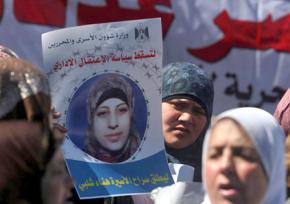On hunger strike against her Israeli jailers
, the co-host of Radio Free Eireann on WBAI in New York City, reports on the heroic struggle of Palestinian political prisoner Hana Shalabi.
HANA SHALABI, a Palestinian political prisoner on hunger strike since February 16, was transferred to an Israeli military hospital as she clung to life by a thread. The transfer took place on March 18, the 34th day of her hunger strike, according to CNN.
According to Jawad Bulos, one of Shalabi's lawyers, "The prosecution and defense teams...met with the military judge Tuesday to look into an appeal, [and a] decision could come as early as next week to either accept the defense appeal for her immediate release or to keep the detention order."
Shalabi is one of approximately 300 Palestinians held under what Israel calls "administrative detention," which means imprisonment orders that can be renewed indefinitely without charges and without the right to a trial. Prior to her transfer to the military hospital, Shalabi had been held in solitary confinement--not even her parents were allowed to visit her.
Raed Mahameed, one of her lawyers, said that a doctor from Physicians for Human Rights examined her in the prison and found that she was suffering from a low heart rate, low blood sugar, weight loss, muscle weakness and yellowing of the eyes. She also had high levels of sodium in her bloodstream, which causes kidney pain and pain in her chest.

The constant agony also prevents her from sleeping, and she is experiencing dizziness and blurred and occasional loss of vision. She is surviving on two pints of water a day and has stopped even taking salt. So far, she has lost nearly 35 pounds.
Her father Yehia Shalabi expressed the family's concern. "My daughter is on hunger strike since they arrested her," he said. "Her health is in danger, because her stomach is empty. She cannot stand, she does not speak." Hana Shalabi's mother and father have joined her hunger strike.
Just before Shalabi was detained and began to refuse food, Khader Adnan ended his own 66-day hunger strike after Israeli authorities pledged they would not renew his administrative detention order if he resumed eating.
According to Jawad Bulos, another of Shalabi's lawyers, "she is in the hospital prison ward by herself, only drinking water and being subjected to a psychological game, being told she is not like Khader Adnan, and no one will hear her case."
JUDGING BY the experience of the Irish hunger strikers of 1980-1981, Hana Shalabi is in very serious danger. Martin Hurson became the first Irish prisoner to die behind bars when his hunger strike entered its 44th day. Many of the surviving Irish hunger strikers had serious damage to their health and never fully recovered.
Hana Shalabi was previously held in administrative detention for 30 months from 2009 to 2011. She was released in a December 2011 prisoner exchange between Israel and the Palestinians. The imprisonment took an emotional toll on Shalabi. She experienced a deep sense of estrangement, and after her release, she seldom left her home or the company of her family.
On February 16, Hana Shalabi was reportedly re-arrested, abused and strip-searched by a male soldier. She immediately announced that she was going on hunger strike, not just demanding her own freedom, but the end of the administrative detention for all Palestinian political prisoners.
Her hunger strike has generated worldwide protests. Palestinians in the West Bank and Gaza have repeatedly rallied to demand her freedom. Thousands of people throughout the world joined in a one-day fast in solidarity. Amnesty International and the UN Special Rapporteur on the situation of human rights in the Palestinian territories have called for her immediate release if Israel does not promptly charge her with a crime and grant her the right to a trial.
Thirty Palestinian political prisoners have joined her hunger strike, and prisoners in jails across Israel have held daylong fasts.
Hana Shalabi's hunger strike is a serious dilemma for the Israeli government. If they let her die, there will be a worldwide outcry at the very least. No one knows what kind of upsurge it could provoke in the West Bank and Gaza. But if they free her, more Palestinian prisoners will go on hunger strike, and Israel's entire system of administrative detention could be in jeopardy.
While the Israelis may look for some kind of face-saving "compromise," Shalabi has rejected an offer to give her a shorter detention order. Recently, the Palestinian Authority rejected a proposal to deport her to the West Bank.
"The story of Hana Shalabi, like that of Khader Adnan before, is, in my opinion, a remarkable example of a struggle that's completely nonviolent towards one's surroundings," said Yael Maron, a spokesperson for Physicians for Human Rights-Israel. "It is the last protest a prisoner can make, and I find it brave and inspiring."


